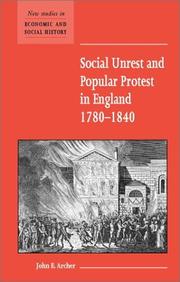| Listing 1 - 10 of 93 | << page >> |
Sort by
|
Book
ISBN: 1447329449 1447329473 1447329414 Year: 2017 Publisher: Bristol, U.K. : Policy Press,
Abstract | Keywords | Export | Availability | Bookmark
 Loading...
Loading...Choose an application
- Reference Manager
- EndNote
- RefWorks (Direct export to RefWorks)
From the squares of Spain to indigenous land in Canada, protest camps are a tactic used around the world. Since 2011 they have gained prominence in recent waves of contentious politics, deployed by movements with wide-ranging demands for social change. Through a series of international and interdisciplinary case studies from five continents, this publication focuses on protest camps as unique organisational forms that transcend particular social movements' contexts.
Protest movements. --- Protest movements --- Demonstrations. --- Demonstrations --- Social aspects. --- Marches (Demonstrations) --- Political demonstrations --- Political marches --- Political rallies --- Public demonstrations --- Rallies (Demonstrations) --- Collective behavior --- Crowds --- Public meetings --- Riots --- Social movements
Book
ISBN: 9782365122252 2365122256 Year: 2019 Publisher: Vulaines sur Seine : Éditions du croquant,
Abstract | Keywords | Export | Availability | Bookmark
 Loading...
Loading...Choose an application
- Reference Manager
- EndNote
- RefWorks (Direct export to RefWorks)
La 4ème de couv. indique : "Démos de Steve Jobs pour le lancement de produits Apple, démonstrations de force lors de grandes manifestations, ou encore preuves de l'existence d'armes de destruction massive en Irak à l'ONU : les démonstrations publiques sont omniprésentes dans la vie sociale et leurs enjeux tant politiques qu'économiques sont considérables. Pourtant, ces phénomènes sont souvent appréhendés comme des événements isolés, voire anecdotiques, et dès lors peu dignes d'un examen systématique. Dans un renversement de perspective, cet ouvrage analyse minutieusement les processus au cours desquels les démonstrations sont conçues et déployées en public, ainsi que les multiples tours de main de leurs auteurs. L'étude s'appuie sur un grand nombre de résultats d'enquêtes réalisées dans divers espaces (e.g. foires, salons informatiques, entreprises, rues), que ce soit sur la période contemporaine ou à travers l'histoire. Claude Rosental montre en quoi les démonstrations publiques constituent non seulement des outils de preuve, de conviction et de promotion, mais aussi des formes fondamentales d'interaction et d'échange. Au-delà des modes de divertissement qu'elles représentent parfois, les démonstrations apparaissent comme des moments intenses qui engagent très largement les alliances, les biens matériels et symboliques, et plus généralement l'avenir des individus et des collectifs. L'ouvrage met ainsi en lumière de quelles manières nous vivons aujourd'hui, comme par le passé, dans une société de démonstration."
Product demonstrations --- Sales promotion --- Social aspects.
Book
ISBN: 0190922087 0190922095 0190922079 Year: 2019 Publisher: New York, NY : Oxford University Press,
Abstract | Keywords | Export | Availability | Bookmark
 Loading...
Loading...Choose an application
- Reference Manager
- EndNote
- RefWorks (Direct export to RefWorks)
Protest movements. --- Demonstrations. --- Political violence. --- Riots.
Book
ISBN: 0190206888 Year: 2014 Publisher: New York : Oxford University Press,
Abstract | Keywords | Export | Availability | Bookmark
 Loading...
Loading...Choose an application
- Reference Manager
- EndNote
- RefWorks (Direct export to RefWorks)
'Powerful Patriots' examines the role of nationalist protest in China's foreign relations from 1978 to 2012, arguing that the Chinese government's decision to allow or repress potentially destabilizing anti-foreign street demonstrations reveals information about its resolve and willingness to compromise in diplomacy.
Demonstrations --- Regions & Countries - Asia & the Middle East --- History & Archaeology --- East Asia --- China --- Politics and government --- Foreign relations. --- Marches (Demonstrations) --- Political demonstrations --- Political marches --- Political rallies --- Public demonstrations --- Rallies (Demonstrations) --- Collective behavior --- Crowds --- Public meetings --- Riots
Book
ISBN: 9782915611595 2915611599 Year: 2010 Publisher: Dijon : Editions Universitaires de Dijon,
Abstract | Keywords | Export | Availability | Bookmark
 Loading...
Loading...Choose an application
- Reference Manager
- EndNote
- RefWorks (Direct export to RefWorks)
Demonstrations --- Protest movements --- Manifestations --- Contestation --- History. --- History --- Histoire
Book
ISBN: 0190915609 0190915617 0190915595 Year: 2019 Publisher: New York, NY : Oxford University Press,
Abstract | Keywords | Export | Availability | Bookmark
 Loading...
Loading...Choose an application
- Reference Manager
- EndNote
- RefWorks (Direct export to RefWorks)
Why do people participate in controversial symbolic events that drive wedges between groups and occasionally spark violence? This text examines this question through an in-depth case study of Northern Ireland. Protestant organizations perform over 2500 parades across Northern Ireland each year.
Parades --- Demonstrations --- Nationalism --- Public opinion. --- Northern Ireland --- Social conditions.
Book
ISBN: 9782724610086 2724610083 Year: 2008 Volume: 2 Publisher: Paris : Presses de Sciences Po,
Abstract | Keywords | Export | Availability | Bookmark
 Loading...
Loading...Choose an application
- Reference Manager
- EndNote
- RefWorks (Direct export to RefWorks)
Dans cet ouvrage de synthèse, les auteurs proposent une analyse sociologique et historique de la manifestation, avec ses normes et ses règles, ses légendes et ses mythes, ses épisodes glorieux et ses heures sombres

ISBN: 2700722868 9782700722864 Year: 1998 Publisher: Paris Aubier
Abstract | Keywords | Export | Availability | Bookmark
 Loading...
Loading...Choose an application
- Reference Manager
- EndNote
- RefWorks (Direct export to RefWorks)
History of France --- National movements --- anno 1900-1999 --- Demonstrations --- Power (Social sciences) --- Manifestations --- Pouvoir (Sciences sociales) --- Protest movements --- History --- France --- Social movements --- Marches (Demonstrations) --- Political demonstrations --- Political marches --- Political rallies --- Public demonstrations --- Rallies (Demonstrations) --- Collective behavior --- Crowds --- Public meetings --- Riots --- Demonstrations - France - History --- Protest movements - France - History --- France - History - 1945 --- -France - History - Third Republic, 1870-1940
Multi
ISBN: 9781107082793 9781316014646 9781107443426 110708279X 1322293341 1316133850 1316121860 1316120775 1107443423 1316130584 1316132765 1316129497 131613167X 1316128407 1316014649 9781316131671 9781316130582 9781316129494 9781316120774 9781316121863 9781316133859 9781316132760 9781316128404 Year: 2015 Publisher: Cambridge Cambridge University Press
Abstract | Keywords | Export | Availability | Bookmark
 Loading...
Loading...Choose an application
- Reference Manager
- EndNote
- RefWorks (Direct export to RefWorks)
Historians of the French Revolution have traditionally emphasised the centrality of violence to revolutionary protest. However, Micah Alpaugh reveals instead the surprising prevalence of non-violent tactics to demonstrate that much of the popular action taken in revolutionary Paris was not in fact violent. Tracing the origins of the political demonstration to the French Revolutionary period, he reveals how Parisian protesters typically tried to avoid violence, conducting campaigns predominantly through peaceful marches, petitions, banquets and mass-meetings, which only rarely escalated to physical force in their stand-offs with authorities. Out of over 750 events, no more than twelve percent appear to have resulted in physical violence at any stage. Rewriting the political history of the people of Paris, Non-Violence and the French Revolution sheds new light on our understanding of Revolutionary France to show that revolutionary sans-culottes played a pivotal role in developing the democratically oriented protest techniques still used today.
History of France --- anno 1700-1799 --- Demonstrations --- Non-violence --- Manifestations --- Résistance politique --- History --- France --- Paris (France) --- Politics and government --- Protest movements --- Nonviolence --- Marches (Demonstrations) --- Political demonstrations --- Political marches --- Political rallies --- Public demonstrations --- Rallies (Demonstrations) --- Revolution (France : 1789-1799) --- Government, Resistance to --- Pacifism --- Social movements --- Collective behavior --- Crowds --- Public meetings --- Riots --- Résistance politique

ISBN: 1107113458 051161229X 1280159936 0511116519 113914572X 051106571X 051105940X 0511555768 0511067844 9780511065712 9780511067846 9780511116513 9780511612299 9780511059407 9780521576567 0521576563 9780521572163 0521572169 9781107113459 9781280159930 9780511555763 9781139145725 Year: 2000 Publisher: Cambridge, UK New York Cambridge University Press
Abstract | Keywords | Export | Availability | Bookmark
 Loading...
Loading...Choose an application
- Reference Manager
- EndNote
- RefWorks (Direct export to RefWorks)
This book, first published in 2000, examines the diversity of protest from 1780 to 1840 and how it altered during this period of extreme change. This textbook covers all forms of protest, including the Gordon Riots of 1780, food riots, Luddism, the radical political reform movement and Peterloo in 1819, and the less well researched anti-enclosure, anti-New Poor Law riots, arson and other forms of 'terroristic' action, up to the advent of Chartism in the 1830s. Archer evaluates the problematic nature of source materials and conflicting interpretations leading to debate, and reviews the historiography and methodology of protest studies. This study of popular protest gives a unique perspective on the social history and conditions of this crucial period and will provide a valuable resource for students and teachers alike.
Demonstrations --- Social conflict --- Class conflict --- Class struggle --- Conflict, Social --- Social tensions --- Interpersonal conflict --- Social psychology --- Sociology --- Marches (Demonstrations) --- Political demonstrations --- Political marches --- Political rallies --- Public demonstrations --- Rallies (Demonstrations) --- Collective behavior --- Crowds --- Public meetings --- Riots --- History. --- England --- Social conditions --- Economic conditions --- sociale conflicten --- 18e eeuw --- 19e eeuw --- Groot-Brittannië --- 18e eeuw. --- 19e eeuw. --- Groot-Brittannië.
| Listing 1 - 10 of 93 | << page >> |
Sort by
|

 Search
Search Feedback
Feedback About UniCat
About UniCat  Help
Help News
News